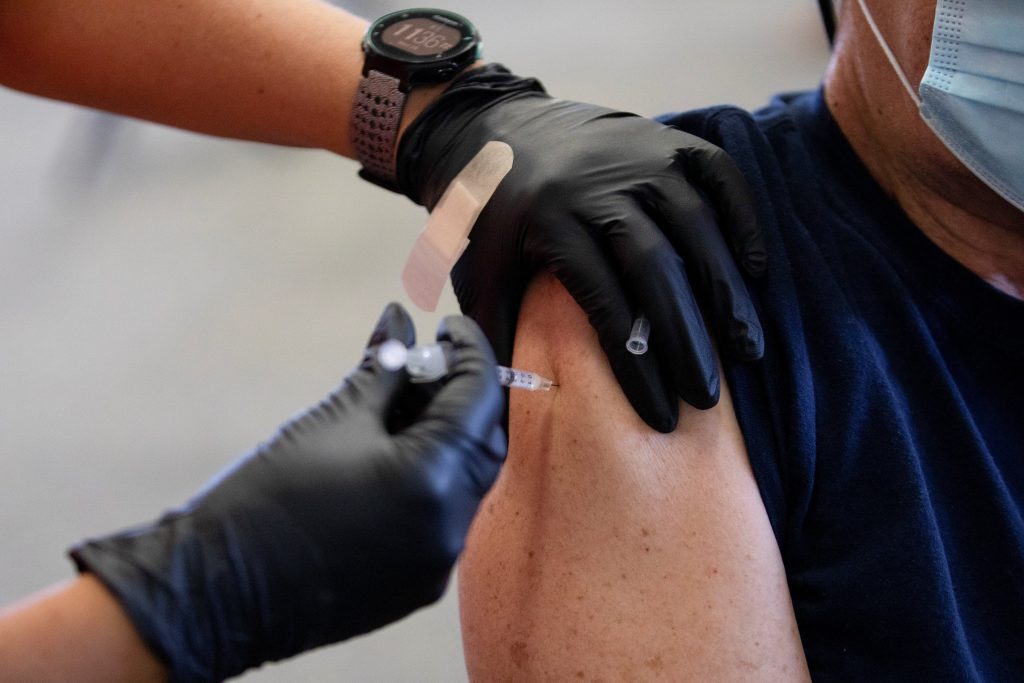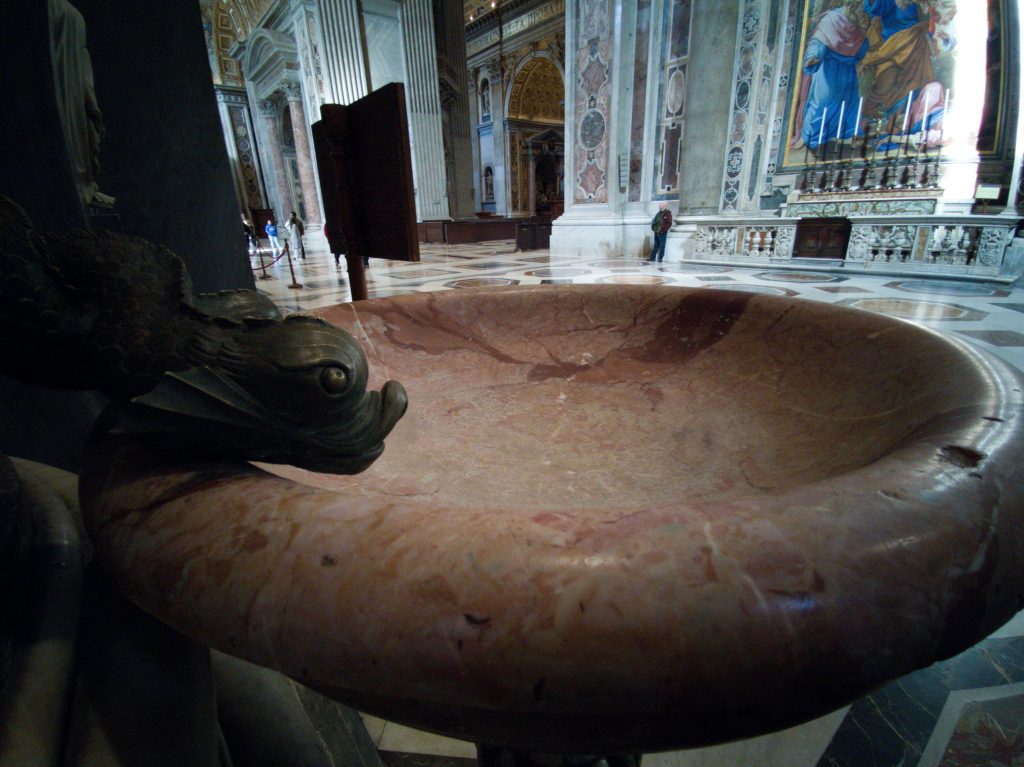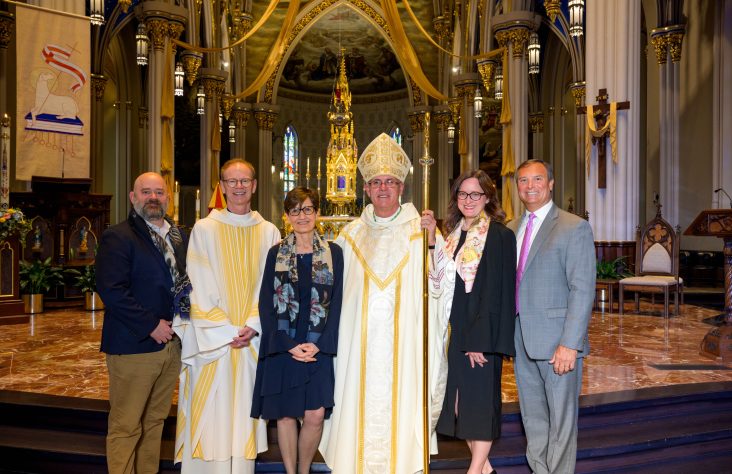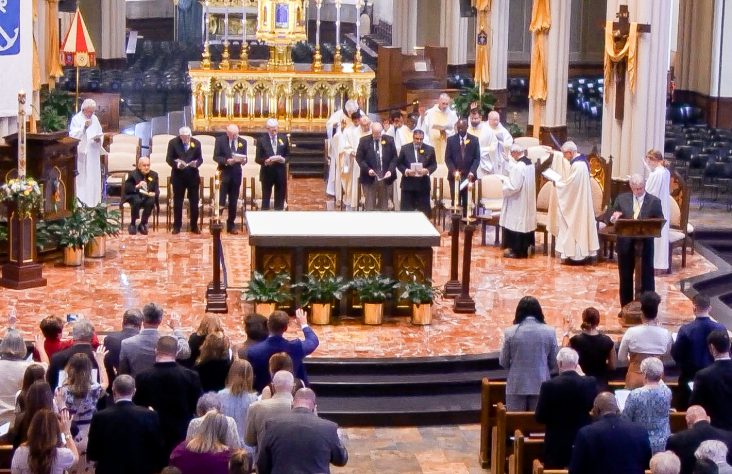November 7, 2023 // National
Bishops Reiterate Moral Permissibility of COVID Vaccines
WASHINGTON, D.C. (OSV News) – The U.S. Catholic bishops have reiterated the moral permissibility of the COVID vaccines available in the United States for Catholics as booster shots become available during flu and cold season.
Asked if the moral guidance on the use of COVID vaccines for Catholics, which were first issued in January of 2021, applied to the latest versions of the vaccines, Chieko Noguchi, Spokeswoman for the U.S. Conference of Catholic Bishops, replied that “the guidance previously given by the USCCB and the moral principles articulated still hold under the circumstances of the new COVID vaccines.”

A patient receives a COVID-19 vaccine booster during a Pfizer-BioNTech vaccination clinic in Southfield, Mich., Sept. 29, 2021. The U.S. Catholic bishops have reiterated the moral permissibility of the COVID vaccines available in the United States for Catholics as booster shots become available ahead of flu and cold season. (OSV News photo/Emily Elconin, Reuters)
During the height of the COVID-19 pandemic in 2020 and 2021, shortly before vaccines were made available to the American public, the Holy See’s Congregation (now Dicastery) for the Doctrine of the Faith, Catholic bishops, and theologians released statements that the COVID-19 vaccines were morally permissible for Catholics to receive. Those statements varied only slightly, as the U.S. bishops encouraged Catholics, where they had such a choice, to seek some brands of vaccines over others due to the degree of connection – although remote – to abortion-derived cell lines.
Of the three COVID vaccines originally approved for emergency use in the United States – from the pharmaceutical companies Moderna, Pfizer, and Johnson & Johnson – the former two were tested with cell lines believed to be derived from an abortion, but not developed with them, while the latter was both developed and tested with such a cell line. The Johnson & Johnson vaccine was later pulled from the market because of the risk of blood clots.
The 2020 statement from the Congregation for the Doctrine of the Faith said Catholics can morally undergo vaccination for COVID-19, adding that such a decision should be voluntary, not compulsory. The statement said that any connection to abortion was remote, but “the licit use of such vaccines does not and should not in any way imply that there is a moral endorsement of the use of cell lines proceeding from aborted fetuses. Both pharmaceutical companies and governmental health agencies are therefore encouraged to produce, approve, distribute, and offer ethically acceptable vaccines that do not create problems of conscience for either health care providers or the people to be vaccinated.”
A December 2020 note from the Vatican COVID-19 Commission in collaboration with the Pontifical Academy for Life underscored the CDF’s determination, rooting it in the CDF’s 2007 instruction Dignitas Personae, which considered the morality of vaccines whose research and development involved stem-cell lines derived from aborted fetuses, a topic the Pontifical Academy for Life readdressed in 2017.

One of several empty holy water fonts is seen in St. Peter’s Basilica at the Vatican in this file photo dated March 4, 2020. During the Covid pandemic churches around the world adopted measures to prevent the spread of the coronavirus. (OSV News photo/Junno Arocho Esteves, CNS)
From that previous work, “we believe that all clinically
recommended vaccinations can be used with a clear conscience and that the use of such vaccines does not signify some sort of cooperation with voluntary abortion. While the commitment to ensuring that every vaccine has no connection in its preparation to any material originating from an abortion, the moral responsibility to vaccinate is reiterated in order to avoid serious health risks for children and the general population,” the academy and commission stated.
Pope Francis himself later appeared with other Church prelates in a public service announcement encouraging people to get vaccinated.
“Thanks to God’s grace and to the work of many, we now have vaccines to protect us from COVID-19,” Pope Francis said in the 2021 PSA. “Getting the vaccines that are authorized by the respective authorities is an act of love. … I pray to God that each one of us can make his or her own small gesture of love. No matter how small, love is always grand.”
The U.S. bishops’ conference in 2021 urged Catholics to select a vaccine “with the least connection to abortion-derived cell lines.”
“Therefore, if one has the ability to choose a vaccine, Pfizer or Moderna’s vaccines should be chosen over Johnson & Johnson’s,” said Bishop Rhoades and Archbishop Joseph F. Naumann of Kansas City, Kansas, then the respective chairmen of the USCCB’s Committee on Doctrine and the Committee on Pro-Life Activities, in the statement.
In July of 2021, officials from the National Catholic Bioethics Center (NCBC) in Philadelphia pointed to the CDF guidance, reiterating that it did not endorse mandated COVID-19 vaccination. “The Church has consistently pointed out the ethical problems with vaccines produced and/or tested using abortion-derived cell lines,” the officials said. “The Church has judged it permissible for people to either accept (under protest) or reject the use of such vaccines. In other words, there is no universal moral obligation to accept or refuse them, and it should be a voluntary decision of the individual.”
Joseph Meaney, President of the NCBC, told OSV News that their guidance on the vaccines remains the same, but argued that “the urgency of the pandemic” has lessened since their introduction, which may impact discernment.
Federal health officials approved a new COVID booster in September, recommending them for anyone 6 months or older. However, the rollout of the vaccines has not been smooth, with some reporting experiencing difficulties getting an appointment or getting their insurance to cover the vaccine.
On its website, officials with the U.S. Food and Drug Administration said the organization “is confident in the safety and effectiveness of these updated vaccines and the agency’s benefit-risk assessment demonstrates that the benefits of these vaccines for individuals 6 months of age and older outweigh their risks.”
The best news. Delivered to your inbox.
Subscribe to our mailing list today.






